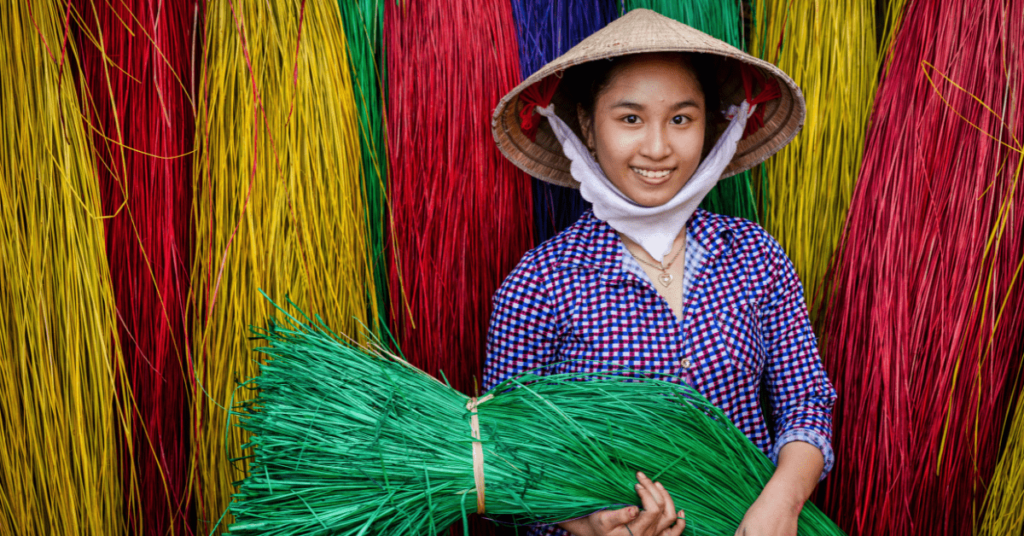MSMEs account for 90% of all businesses, generate 50% of global GDP, and provide livelihoods for 60 to 70% of the working population. In Asia, MSMEs account for 96% of total enterprises, employ 62% of the labour workforce and contribute an average of 42% of gross domestic product (GDP). However, the credit gap in Asia for the sector is estimated at $2.7 trillion, due to restrictions on finance, equity, and payment services (United Nations ESCAP, 2022).
The challenge of the MSME credit gap is further exacerbated for women-led MSMEs in the region. Fewer than four out of every ten MSMEs are owned by women in the APAC region and based on findings from International Finance Corporation’s (IFC) Enterprise Finance Gap Assessment Database, East Asia and the Pacific have the highest overall number of women-owned MSMEs, while South Asia has the least.
As part of the commitment to furthering the gender equality agenda, AVPN in partnership with Visa Foundation, convened a Gender-Diverse MSMEs Taskforce at the B20 Summit in Bali in 2022 under the Indonesian presidency with the view to consolidate and table key recommendations to the Indian G20 presidency under the B20 engagement group.
Over the last 10 months, the Task Force brought together 35 diverse leaders from policy, corporates, and the social investment community to make key recommendations on the expansion and strengthening of gender-diverse MSMEs in the Asia Pacific region (with a priority focus on developing economies in South and Southeast Asia) including members from Asian Development Bank, UN Women, Sasakawa Peace Foundation, Global Innovation Fund, UNDP, Upaya Ventures, Villgro, impact investment firms and more.
The primary aim was to gather diverse perspectives and formulate impactful recommendations that would contribute to the sustainable growth of women-led MSMEs in the Asia Pacific region, with a particular focus on emerging economies in South and Southeast Asia. This endeavour aimed not only to empower women economically but also to stimulate equitable economic expansion and job creation within the region.
AVPN’s Taskforce, with valued support from Accenture Development Partnerships (ADP), identified critical barriers to the scaling of women-led MSMEs in Asia across the 3 working groups:
- Working Group 1 for Access to Finance and Markets
- Working Group 2 for Digital Inclusion & Transformation
- Working Group 3 for Climate Risk and Adaptation
In efforts to amplify the Taskforce’s recommendations, AVPN in collaboration with the Confederation of Indian Industry (CII) was able to lay out critical barriers to scaling financing and support for gender-diverse MSMEs and proposed tangible solutions which have been reflected in the final B20 Communique under the Indian Presidency. The Engagement Group’s communique R.A.I.S.E (Responsible, Accelerated, Innovative, Sustainable, Equitable), stressed scaling financing needs for MSMEs and especially drawing on the scope for women-led MSMEs through committing to a Credit Enhancement Fund (CEF) and “sustainable finance standards and build the capacity of national financial sectors to ensure adequate financing for achieving SDGs” for MSMEs and alternative financing mechanisms, supporting their access to markets and innovation.
These efforts by the taskforce and its reiteration within the B20 communique underscores the significance of prioritising the MSME sector for both the public and private sectors. The communique further advocates for the adoption of blended finance mechanisms to enable access to finance, credit, and the global value chain for women-led MSMEs.
As we come close to the end of 2023, AVPN is delighted to launch the Gender-Diverse MSME Taskforce report which draws upon specific recommendations for governments and the private sector to solve for women’s economic empowerment through scaling solutions for gender-diverse MSMEs in Asia.
As the Global South continues toward a pathway of economic growth, AVPN’s Gender Diverse MSME Taskforce’s work will continue addressing the needs of scaling women-led MSMEs across policy forums as Global South counties continue to take over the baton of relevant policy forums.

















